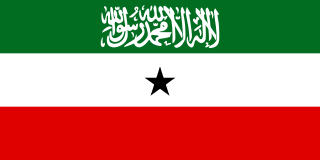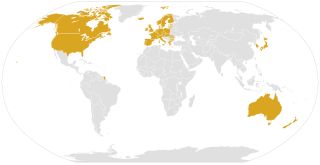Related Research Articles

Somalia, officially the Federal Republic of Somalia, is a country in the Horn of Africa. It is bordered by Ethiopia to the west, Djibouti to the Northwest, the Gulf of Aden to the north, the Indian Ocean to the east, and Kenya to the southwest. Somalia has the longest coastline on Africa's mainland. Its terrain consists mainly of plateaus, plains, and highlands. Hot conditions prevail year-round, with periodic monsoon winds and irregular rainfall.

This is a list of diplomatic missions of Somalia, excluding honorary consulates. Foreign relations of Somalia are handled primarily by the President as the head of state, the Prime Minister as the head of government, and the Minister of Foreign Affairs of the Federal Government.

Organizations which are independent of government involvement are known as non-governmental organizations or non-government organizations, with NGO as an acronym. NGOs are a subgroup of organizations founded by citizens, which include clubs and associations that provide services to their members and others. NGOs are usually nonprofit organizations, and many of them are active in humanitarianism or the social sciences. Surveys indicate that NGOs have a high degree of public trust, which can make them a useful proxy for the concerns of society and stakeholders. However, NGOs can also be lobby groups for corporations, such as the World Economic Forum. According to NGO.org, "[an NGO is] any non-profit, voluntary citizens' group which is organized on a local, national or international level ... Task-oriented and driven by people with a common interest, NGOs perform a variety of service and humanitarian functions, bring citizen concerns to Governments, advocate and monitor policies and encourage political participation through provision of information."

Somaliland, officially the Republic of Somaliland, is a self-declared sovereign state in the Horn of Africa, internationally considered to be part of Somalia. The government of Somaliland regards itself as the successor state to British Somaliland, which, as the briefly independent State of Somaliland, united in 1960 with the Trust Territory of Somaliland to form the Somali Republic.

Development aid is aid given by governments and other agencies to support the economic, environmental, social, and political development of developing countries. Closely-related concepts include: foreign aid,international aid, overseas aid, developmental aid, developmentassistance, official development assistance (ODA), development cooperation and technical assistance. It is distinguished from humanitarian aid by aiming at a sustained improvement in the conditions in a developing country, rather than short-term relief. Development aid is thus widely seen as a major way to meet Sustainable Development Goal 1 for the developing nations.
Aid effectiveness is the degree of success or failure of international aid. Concern with aid effectiveness might be at a high level of generality, or it might be more detailed.
The Multilateral Agreement on Investment (MAI) was a draft agreement negotiated in secret between members of the Organisation for Economic Co-operation and Development (OECD) between 1995 and 1998. It sought to establish a new body of universal investment laws that would grant corporations unconditional rights to engage in financial operations around the world, without any regard to national laws and citizens' rights. The draft gave corporations a right to sue governments if national health, labor or environment legislation threatened their interests. When its draft became public in 1997, it drew widespread criticism from civil society groups and developing countries, particularly over the possibility that the agreement would make it difficult to regulate foreign investors. After an intense global campaign was waged against the MAI by the treaty's critics, the host nation France announced in October 1998 that it would not support the agreement, effectively preventing its adoption due to the OECD's consensus procedures.
The OECD Guidelines for Multinational Enterprises are recommendations on responsible business conduct addressed by governments to multinational enterprises operating in or from the 49 adhering countries. The Guidelines provide non-binding principles and standards for responsible business conduct in a global context that are consistent with applicable laws and internationally recognised standards.

The Organisation for Economic Co-operation and Development's (OECD) Development Assistance Committee (DAC) is a forum to discuss issues surrounding aid, development and poverty reduction in developing countries. It describes itself as being the "venue and voice" of the world's major donor countries.
The Development Assistance Database (DAD) is an Aid Information Management System (AIMS) developed by Synergy International Systems, for tracking development aid and managing official development assistance with transparency and accountability. DAD is widely adopted AIMS which has been established in more than 35 countries worldwide in close cooperation with UNDP and respective governments.
{{multiple issues|
Space industry refers to economic activities related to manufacturing components that go into Earth's orbit or beyond, delivering them to those regions, and related services. Owing to the prominence of the satellite-related activities, some sources use the term satellite industry interchangeably with the term space industry. The term space business has also been used. A narrow definition encompasses only hardware providers. This definition does not exclude certain activities, such as space tourism. Thus more broadly, space industry can be described as the companies involved in the space economy, and providing goods and services related to space. Space economy has been defined as "all public and private actors involved in developing and providing space-enabled products and services. It comprises a long value-added chaining, starting with research and development actors and manufacturers of space hardware and ending with the providers of space-enabled products and services to final users."

Education in Somalia refers to the academic system within Somalia. The Ministry of Education is officially responsible for education in Somalia, with about 15% of the nation's budget allocated to scholastic instruction. The breakaway republic of Somaliland maintain its own advanced Ministry of Education.

Canada–Mali relations concern the bilateral relationship between the countries of Canada and Mali. Mali has an embassy in Ottawa whilst Canada has an embassy in Bamako.
INTERSOS is a non-profit humanitarian aid organization that works to assist victims of natural disaster and armed conflict. INTERSOS has operated as an independent organization since its foundation in 1992. A Mine Action Unit was established within INTERSOS to deal specifically with the mine danger and its effects through mine awareness, victims assistance and mine clearance operations.

The OECD Development Centre was established in 1961 as an independent platform for knowledge sharing and policy dialogue between Organisation for Economic Co-operation and Development member countries and developing economies, allowing these countries to interact on an equal footing.

The Organisation for Economic Co-operation and Development is an intergovernmental economic organisation with 37 member countries, founded in 1961 to stimulate economic progress and world trade. It is a forum of countries describing themselves as committed to democracy and the market economy, providing a platform to compare policy experiences, seek answers to common problems, identify good practices and coordinate domestic and international policies of its members. Generally, OECD members are high-income economies with a very high Human Development Index (HDI) and are regarded as developed countries. As of 2017, the OECD member countries collectively comprised 62.2% of global nominal GDP and 42.8% of global GDP at purchasing power parity. The OECD is an official United Nations observer.

Andrew Michael Boraine is an international expert on economic and urban development and partnering for systems change, who has worked in the development sector in South Africa for more than 41 years. He was a senior official in the constitutional department of Nelson Mandela’s government in the immediate post-Apartheid years, and was the first post-Apartheid City Manager of Cape Town. Boraine later founded the South African Cities Network and helped to establish the Cape Town Partnership, of which he was CEO for 10 years between 2003 and 2013. He is currently CEO of the Western Cape Economic Development Partnership (EDP). In 2017, Andrew participated in the Rockefeller Foundation Bellagio Center Residency Program where he researched "the role of partnering and partnerships in steering and managing complex societal transitions" in relation to city and regional development.
IIDA Women's Development Organisation is a non-governmental organisation based in Mogadishu, Somalia. Its work is centered on peacebuilding, active citizenship for women, and other initiatives in the local education, health and economy sectors.
References
- ↑ Ould-Mey, Mohameden (1996). Global restructuring and peripheral states: the carrot and the stick in Mauritania. Rowman & Littlefield. p. 139. ISBN 0-8226-3051-6 . Retrieved 2009-06-22.
- ↑ Organisation for Economic Co-operation and Development (1997). International co-operation for habitat and urban development: directory of non-governmental organisations in OECD countries. OECD Publishing. p. 301. ISBN 92-64-05537-1 . Retrieved 2009-06-22.
- ↑ Somalia NGO Consortium Handbook 2005. Somalia NGO Consortium. 2005. p. 13.